#poetry essay
Text
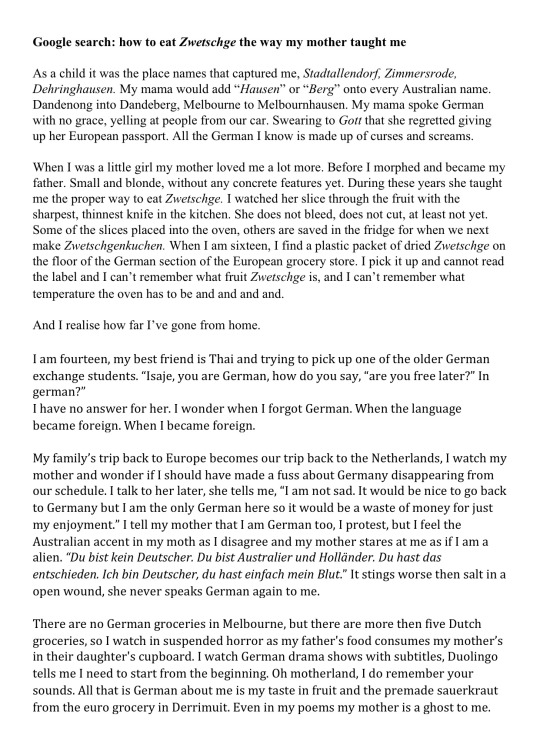
My whole life I have told people, “I am Dutch, but my mother is German.”
#diaspora#diaspora poetry#my poetry#dutch#poem#poetry#bad poetry#dutch diaspora#diaspora blues#German#German poetry#German poet#German diaspora#German Australian#German American#writing#spilled thoughts#spilled ink#contemporary poetry#poetry essay#immigrant#immigration#immigrant poem#immigrant poetry#European immigrant#Central European
4 notes
·
View notes
Text

https://ethicaldative.com/
Glory on the site: EthicalDative
'Thoughts on art and language by an amateur painter and former linguist.'
Again, I have no idea how I found this site but I'm fucking glad I did. JMN gives rich and personable insights into art and poetry - in the past two months they've shared translations of Ancient Arabic poets Al-Khansā and ^Umar ibn Abī Rabī^a. This is cool to me for a lot of reasons, and this is my first time reading Arabic poetry.
My only interaction with this alphabet has been the 'mistranslated' Farsi in Kathy Acker's Blood and Guts in High School. I'm linking Zeena Yasmine Fuleihan's great critical essay of this aspect of Acker's novel below:
https://blog.pshares.org/the-overlooked-mistranslations-in-blood-and-guts-in-high-school/
JMN accompanies the majority of their posts with line drawings, mainly bespectacled portraits. I would like all of them tattooed on me, if I could afford the food bill. They are great and I imagine JMN must provide illustrations for anthologies.
#glory on the site#ethicaldative#art resource#poetry resource#contemporary poetry#ancient poetry#arabic poetry#american poetry#british poetry#poetry essay#to read#kathy acker#art texts#prose texts#blood and guts in high school#poetry masterpost#Zeena Yasmine Fuleihan#prose essay
3 notes
·
View notes
Text
The Human Desire to be Loved (Poetry Analysis)
I wrote this essay for my advanced literature class earlier this year (2022) and have decided to post it for Pride Month, since I'm super happy with it!
DISCLAIMER: there is one small part where I mention the The Abyssinian Baptist Church that I wished to have done slightly more research on to further verify my claim, but I have decided to keep this unedited from what I submitted for my assignment.
I have removed in-text referencing to make it easier to read, but have included my entire bibliography under the essay.
I would advise that you have a look at both poems in full before reading this. They can be found at in the links corresponding to their poems: Homosexuality by Frank O'Hara and Swing-Set by Andrea Gibson.
Finally, this is all my opinion. Please try to be nice if you're giving criticisms, for while this was for an assignment I'm sharing it for fun! If you want to chat in the tags, reblog etc, please do, I'd be happy to talk about it more!
Without any further ado, please enjoy!
Frank O’Hara and Andrea Gibson
The Human Desire to be Loved
an illustrated poetry analysis by quasar_concept
----------
One of humanity’s innate desires is to be loved and accepted by a community. This is true within families, friend groups, and society at large, and is a desire echoed in protests against the injustices faced by minorities as a result of people not caring for those they deem ‘other.’ Gay poet Frank O’Hara (1926 – 1966) and Andrea Gibson (1975 – Present), known for their influential queer-political poetry, both demonstrate this desire to be ‘seen’—accepted, acknowledge and loved—through their poetry, particularly in O’Hara’s Homosexuality and Gibson’s Swing-Set. Though the poems differ greatly due to the stylistic conventions and social constraints of their respective times, both effectively communicate the innate desire to have their identities ‘seen.’
The amount—or lack thereof—of figurative language in each poem clearly illustrates the standard in which the poems were written. In contrast to Homosexuality, Gibson’s Swing-Set uses very little figurative language, while O’Hara makes ample use of it. In Swing-Set, Gibson relies on imagery, tone and repetition to reflect the direct nature modern activism is known for; to emphasise and advance awareness on the social issues they discuss within their poetry, particularly against the gender binary and discrimination towards genderqueer people.
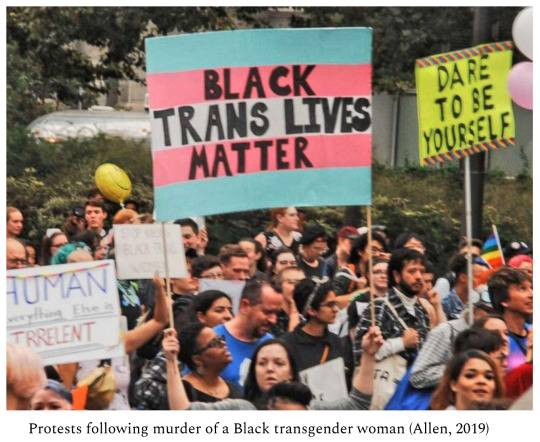
Gibson’s works invoke the style of slam poetry, which emerged from competitive poetry readings in the 1990s. Slam poetry developed from the rise in popularity of “countercultural” movements in the 1950s such as beat poetry—performance poetry that valued the rejection of standard values. The imagery Gibson employs assists in creating the tones which shift throughout the poem as the situations change. Gibson establishes a humorous tone to support the larger criticism they makes within the poetry with images such as:
What do you think of that…Timmy?”
“Um…my mom says that even though you’ve got
hairs that grow from your legs
and the hairs on your head grow short and pokey
and you smell really bad like my dad
that you’re a girl.”
Acceptance is vital to humanity’s desire for love, and Gibson expresses criticism towards adults teaching children to see people as ‘other’ over teaching acceptance. Gibson contrasts the humorous tone with a combative tone and harsher imagery.
My father sitting across the table at Christmas dinner
gritting his teeth over his still-full plate
his appetite raped away
by the intrusion of my haircut,
This demonstrates the shifts in tone, and serves to express the ridiculous nature of being offended by such inconsequential things as a haircut. The poem’s tone shifts to one that scrutinises the reactions of the people interacting with the speaker. Gibson effectively balances the tones within the poem: The repeated humour provides light entertainment for the audience, and emphasises the tensions and message within the poem. The repeated humour is accompanied by the central question, “can I have a push on the swing”, which builds up to Gibson’s message that other people’s self-expression should only be their concern, not other people’s, and that adults should adopt the simple idea of focusing on themselves (“And someday,/ when we grow up/ it’s all gonna be that simple.”)
O’Hara’s Homosexuality, on the other hand, has a much higher level of figurative language within it.

O’Hara wrote poetry for a small niche of friends, most of whom were expressionist painters, such as Jackson Pollock, and most of his work was published post-mortem. As a result of their influences and his own experiences as a musician at Harvard before earning a masters degree in English, O’Hara’s poetry explored the mundane and therefore went against the poetic conventions of the time, and he was not widely well-known for his poetry. His use of figurative language reflects the ‘hidden’ nature of queer society, but figurative language not uncommonly used.
Homosexuality has many allusions to places and movements that would have been well-known and easily identifiable by the queer community of the time but would have been more ambiguous to other members of society. For example, “light on his feet” was a euphemism for saying a man was gay, and this is subtly referenced within the poem (“...without hope that our delicate feet// will touch the earth again, let alone "very soon."”) During O’Hara’s lifetime the queer community was a taboo topic, known to exist by those outside it but hidden under euphemisms and wilful ignorance; the use of figurative language and allusions to the queer community in Homosexuality clearly reflects this attitude.
This attitude against the queer community was also found in political decisions but was, again, not directly acknowledge. In 1923 a bill, known as the Schakno Bill, was introduced to make anonymous hook-ups in public spaces illegal. This directly countered the common practice within the queer community known as ‘cruising.’ Cruising was the action of—usually outdoor—anonymous hook-ups, most often in parks, which O’Hara references in his poem (“The good//love a park and the inept a railway station…”), though other places were also commonly used. O’Hara also makes reference to the “lengthening shadow of an Abyssinian head,” an allusion to the The Abyssinian Baptist Church in New York, prominent for its anti-queer stance, and its spreading “shadow” of influence, particularly to Black communities.
O’Hara contrasts these more negative allusions with figurative language that evokes images of strong, vocal parts of the queer community. The specific use of “divine” and “drag” evokes images of Drag Queens, particularly prominent in the 1950s and 60s. Drag Queens were not spared the bigotry of the time, but were the most visible and some of the most distinct members of the queer community. O’Hara’s use of figurative language offers refuge and understanding to other members of the queer community with a clear call-to-action, though it provides enough ambiguity that some readers could continue in their ignorance.
Despite both poems containing vastly different amounts of figurative language, they achieve similar purposes and demonstrate the differences in not only poetic conventions but societal ones. The poems each draw the audience’s attention to the central themes effectively, Gibson with direct criticism and O’Hara by drawing focus to the figurative language, both demonstrating period-typical stylistic techniques, and expressing the desire to be ‘seen.’
Both poets use structure and sound devices to enhance the effectiveness of their poems, and their differing styles influence the way in which they incorporate the devices into their poems. Gibson’s poetry is often written as slam poetry, a style of poetry that is intended to be performed to an audience with roots in the anti-establishment beat poetry.

As a result the structure of their poem relies heavily on the sounds of the words while the structure is more free, narrative-style poetry. The free structure is limited in the written form of the poem, and to create a flow to the poem and emphasise the tones that are lost when the poem is not performed, Gibson employs enjambment. Gibson uses sound devices such as assonance and rhyme to emphasise the poem’s tone when spoken aloud. “Gritting his teeth over his still-full plate/ his appetite raped away/ by the intrusion of my haircut” and “paranoid parental hand/ pushing aside the best education on self/ that little girl’s ever gonna get…” having repeated hard consonant sounds that emphasises the critical and angry tone Gibson creates. In contrast, Gibson also uses assonance to establish a gentle tone with the children in the poem, such as the repeated soft S sound “Kids, do you know that some of the stars/we see up in the sky are so far away they’ve already burned out?”. Through the sudden change from round vowels to open vowels, the repetition of assonance also provides humour:
‘Um… my mom says that even though you’ve got
hairs that grow from your legs
and the hairs on your head grow short and pokey
and you smell really bad like my dad
that you’re a girl.’
Gibson manipulates the consonant and vowel sounds throughout the poem to invoke imagery and tones, and this creates a poem that is both entertaining and an effective protest against hate.
In contrast to the free structure of Swing-Set, Homosexuality has a consistent structure, and employs some sound devices to emphasise the thematic ideas. The poem is split into eleven open couplets, which reflects the poem’s idea of being open to acceptance of others and oneself. The only sentence within the poem that is contained to a single line (“It is the law of my own voice I shall investigate.”) emphasises the introspective nature of being queer in an openly homophobic society. The couplets also serve for assonance to be used in small groups to achieve cohesion between and within the couplets (“in the rain. It’s wonderful to admire oneself/with complete candor, tallying up the merits of each…”). These groups possibly reflect the time O’Hara spent as a musician, as the groups of sounds are similar to musical phrases that follow certain patterns to create the same effect of cohesion. The sound devices are undoubtedly deliberately used within the poem and enhance its quality, though have little connection to the theme.
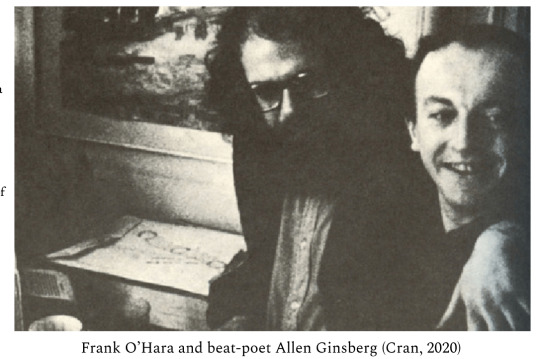
However, the minimalistic sound devices reflect the expectations of the audience; though spoken-word, performance poetry was on the rise in the early-mid 20th century—O’Hara was known to be friends with beat-poet Allen Ginsburg—it was far more common for poetry to be read privately. O’Hara’s structure and visual devices assist in developing the theme rather than the sound devices, while Gibson’s sound devices emphasise the tone to build the theme. Through these methods, the themes of the poems are effectively developed. The repetition of assonance occurs in both poems to different immediate effects but, used in conjunction with each poem’s entirety, convey similar themes.
The poems, though they differ greatly on the surface, share the same, clear message at their hearts. O’Hara’s art and musicality shows clearly through his use of figurative language and allusions, where Gibson’s imagery and deliberate sound devices convey their political fire and confrontational style, but both use similar diction to convey the message at the heart of their poems. In keeping with the open nature of much of late 20th, 21st century poetry, and their own signature style, Gibson does not create ambiguities about the message in the heart of their poem, but instead chooses to culminate the poem through repetition. By repeating the phrase “Can I have a push on the swing?” an impactful three times, Gibson creates a cyclical poem that shows the message of acceptance and normality. The minimal layers of ambiguity that are present are related to the complex mix of anger towards the past and hope for the future. These emotions are clearly found in the shifts in tone within the heart of the poem:
‘cause tomorrow
I start my day with twenty-eight minds
that know a hell of a lot more than you do,
and if I show up in a pink frilly dress
those kids won’t love me any more or less.”
“Hey… are you a boy or a… oh, never mind,
can I have a push on the swing?”
And someday,
when we grow up,
it’s all gonna be that simple.
Despite these complex emotions, the poem concludes with a tone that is hopeful and a subtle call-to-action for not only to be done to accept queer people, but to “grow up” and become more accepting.
Homosexuality comes to a conclusion with a subtle call-to-action as well, though with a more melancholic tone and more ambiguity than Swing-Set. One interpretation of the conclusion of Homosexuality involves acknowledgement of the fact that the volume at which people ask for acceptance does not indicate the amount they wish to be accepted and loved.

O’Hara reflects the anonymity that many queer people in the early-mid 20th century would have sought due to a lack of acceptance by alluding to anonymity (“The good//love a park and the inept a railway station…”), and contrasts with a louder expression of self-expression in spite of discrimination (“and there are the divine ones who drag themselves up//and down the lengthening shadow of an Abyssinian head/in the dust, trailing their long elegant heels of hot air…”). The closing lines of the poem are a soft call-to-action, and express clearly and openly the desire to be accepted. "It's a summer day,/and I want to be wanted more than anything else in the world.”. These sentiments were echoed in the Stonewall Riots of 1969, when—three years after O’Hara’s death— tensions culminated after continuous harassment of queer establishments. O’Hara uses layers of ambiguity within his work to express the taboo of its subject, but he, like Gibson, does not leave questions about the central themes and hopes within the poem.
Both poems clearly demonstrate the same theme, despite the way in which different social expectations impacted the expression of it. The innate human desire for love is displayed clearly in their poetry despite the differences in style and time period.
It can be said that the two poems which contrast in their executions but not their messages reflect the changes and similarities between the social atmospheres of the time. Homosexuality was written in the context of rising tensions between society and the queer community, which resulted in the Stonewall Riots. The taboo attitude towards the queer community is clear within O’Hara’s poem, and serve to build up the frustrations of the queer community. Gibson’s work is confined to contemporary society where the frustrations of minorities are almost required to be public, or else are treated as though they do not exist, and so Gibson’s works reflect the combative nature of contemporary activism. Both poems, however different in style, both contain a call-to-action: they ask for the love and acceptance of the wider community. O’Hara and Gibson both explicitly and desperately express the desire to be accepted, regardless of their differences . As humans, people desire love and community; no one should need to beg for love.
Bibliography
"About Andrea Gibson | Academy Of American Poets". Poets.Org, 2022, https://poets.org/poet/andrea-gibson#poet__works.
"About Frank O'hara | Academy Of American Poets". Poets.Org, 2022, https://poets.org/poet/frank-ohara.
"Andrea Gibson - Biography". Button Poetry, 2022, https://buttonpoetry.com/andrea-gibson/.
"NYC LGBT Historic Sites Project". Nyclgbtsites.Org, 2022, https://www.nyclgbtsites.org/.
Allen, Karma. "Not Enough 'Outrage' In Wake Of Rampant Anti-Transgender Murders: Activists". Abcnews, 2019, https://abcnews.go.com/US/outrage-wake-rampant-anti-transgender-murders-activists/story?id=63172530.
Buckman, Nathan. "The poetic mode of resistance: advancing social awareness through Gibson's spoken-word poetry. MDSoar, 2017, https://mdsoar.org/handle/11603/7719.
Cotter, Holland. "A Louder Voice For Poetry; From Self-Publication In The 50'S To Contests Today (Published 1998)". Nytimes.Com, 1998, https://www.nytimes.com/1998/07/14/books/a-louder-voice-for-poetry-from-self-publication-in-the-50-s-to-contests-today.html?pagewanted=all.
Cran, Rona. "‘Safe In Your Thoughtful Arms’: The Radical Friendship Of Frank O’Hara And Allen Ginsberg". History Workshop, 2020, https://www.historyworkshop.org.uk/safe-in-your-thoughtful-arms-the-radical-friendship-of-frank-ohara-and-allen-ginsberg/.
Davis, Kate, and David Heilbroner. Stonewall Uprising. PBS, 2010.
F. Butterick, George, and Robert J. Bertholf. "Frank O'hara | Poetry Foundation". Poetry Foundation, 2022, https://www.poetryfoundation.org/poets/frank-ohara.
Gibson, Andrea. Pole Dancing To Gospel Hymns. 1st ed., Write Bloody Publishing, 2008.
Gibson, Andrea. "Pole Dancing To Gospel Hymns | Chapter 11". Booksvooks, 2010, https://booksvooks.com/fullbook/pole-dancing-to-gospel-hymns-pdf-andrea-gibson.html?page=11.
Granville-Smith, Maureen. "Frank O'hara - Poet (1926-1966)". Frank O'hara.Org, 2022, https://www.frankohara.org/.
Howarth, Peter. "The Rise And Rise Of Performance Poetry". The Independent, 2015, https://www.independent.co.uk/arts-entertainment/books/features/national-poetry-day-the-rise-and-rise-of-performance-poetry-a6683576.html.
"Light On The Feet". Urban Dictionary, 2005, https://www.urbandictionary.com/define.php?term=light%20on%20the%20feet.
Lowney, John. "The "Post-Anti-Esthetic" Poetics Of Frank O'hara". Contemporary Literature, vol 32, no. 2, 1991, pp. 244-264., Accessed 31 Jan 2022.
O'Hara, Frank. "Homosexuality By Frank O'hara | Poetry Magazine". Poetry Magazine, 1970, https://www.poetryfoundation.org/poetrymagazine/browse?volume=116&issue=2&page=50.
Russell, Thaddeus. "The Color Of Discipline: Civil Rights And Black Sexuality". American Quarterly, vol 60, no. 1, 2008, pp. 101-128., Accessed 31 Jan 2022.
Ryan, Hugh. "Why Queer Archives Are Important: A Study Of LGBTQ Life - Google Arts & Culture". Google Arts & Culture, 2019, https://artsandculture.google.com/story/why-queer-archives-are-important-a-study-of-lgbtq-life/IgUxCMW95_E9-Q?hl=en.
Shaw, Lytle. Frank O'Hara: The Poetics Of Coterie. University Of Iowa Press, 2006.
Sultan, Hazar. "Gender-Queer Identity And Resistance To Gender Binary In Andrea Gibson&Apos;S Poetry". DIVA, 2015, https://www.diva-portal.org/smash/record.jsf?pid=diva2%3A908133&dswid=-9784.
Walsh, Colleen. "Harvard Scholars Reflect On The History And Legacy Of The Stonewall Riots". Harvard Gazette, 2019, https://news.harvard.edu/gazette/story/2019/06/harvard-scholars-reflect-on-the-history-and-legacy-of-the-stonewall-riots/.
Ward, David. "Remembering Frank O'hara | National Portrait Gallery". National Portrait Gallery, 2016, https://npg.si.edu/blog/remembering-frank-ohara.
#pride month#queer history#queer poetry#poetry analysis#poetry#slam poetry#spoken word poetry#literature#gay poetry#illustrated essay#poetry essay#essay on poetry#i've never written alt text before so i hope this is okay! /gen#queer person writes about queer people's poetry
6 notes
·
View notes
Text

secrets of farming (1863) - john w. large
"yeowch augh taking damage ough eurgh"
#sorry i havent been super active#have been dealing w personal and health issues etc#leave some good horror movies down below#or video essays#either one#we just closed the seagull#will forever be abnormal about that show#anyway!#blackout poem#blackout poetry#author#book#poetry
13K notes
·
View notes
Text
hiya :)
welcome to my brand new blog for poetry analysis and discussion! i’ve always been a big lover of poetry and the philosophies hidden inside of them, and i’d love to engage with the community to expand my knowledge and help others where i can!
i intended to post the following forms of content:
favourite poems/quotes💗
poetry analysis🪽
poetry reviews/essays🕰️
my own original poems🪿
study tips📖
questions and discussions🍰
my name is alice and i hope you’ll enjoy my blog 🫶🏻💗🍊
#poetry#poems#poetry analysis#poems and quotes#poet#poem#love poem#autumn#fall aesthetic#lovecore#love poems#blog#poetry essay#new blog#first post#new tumblr#new tumblog#poets on tumblr#autumn poems#poetic#original poem#original writing#blogger#aesthetic#poetry discussion
0 notes
Text










@heavensghost // Erin Moran, "940 Main Street" // Jason Schneiderman, "Little Red Riding Wolf" // @mah_hirano on tw // Adrienne Rich, "Planetarium" // Richard Siken, Editor's Pages: Black Telephone // Molly McCully Brown, Places I've Taken my Body: Essays // @loputyn // Mason O'Hern, "You Are Not Just Anything" // Friedrich Nietzsche, Good and Evil
#theme: a woman in the shape of a monster#web weaving#web weave#webs#poetry#prose#aesthetic#prose poetry#literature#art#book quotes#novels#books#novel quotes#essays#quotes#words#writing#inspo#compilation#parallels#on womanhood#on femininity#femininity#womanhood#illustration#richard siken#friedrich nietzsche#nietzche#poems
3K notes
·
View notes
Text
It seemed more honest to remain silent.
Ingeborg Bachmann, quoted by R. Kolewe in 'Afterletters: From an essay on desire'
3K notes
·
View notes
Text


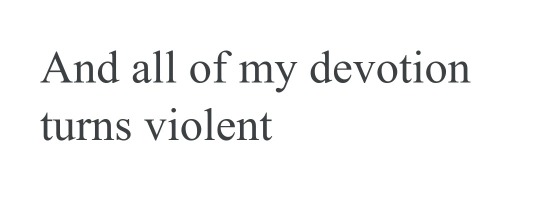

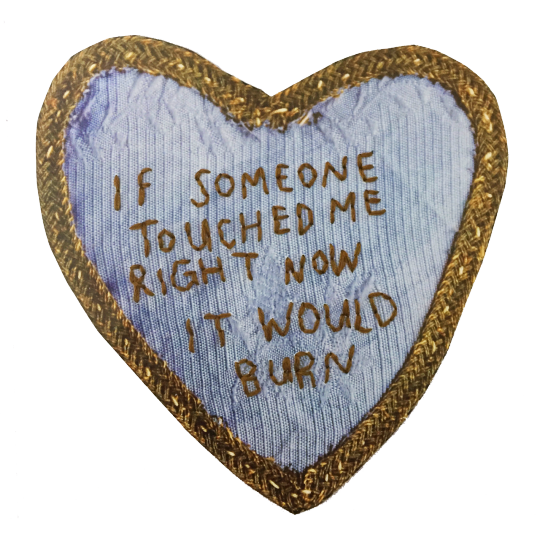


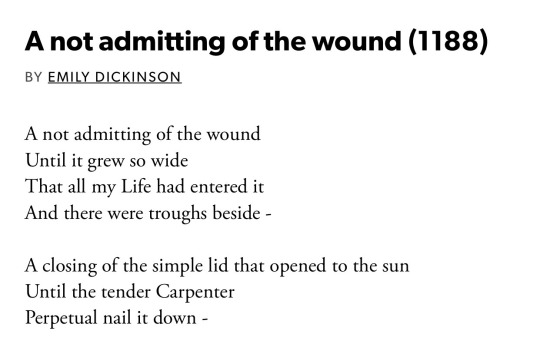

and I'm sorry I left, but it was for the best my little dove...
absolute solitude: selected poems, dulce maria loynaz (tr. james o'connor) // the glass essay, anne carson // boyish, japanese breakfast // @uglyfruit // yves olade // hunger, harry styles // a not admitting of the wound, emily dickinson // no surprises, radiohead // fourth of july, sufjan stevens
#fun fact#fourth of july is one of his favorite songs#god i cant#web weaving#parallels#poetry#dulce maria loynaz#the glass essay#anne carson#breakup#i guess#litany in which certain things are crossed out#richard siken#uglyfruit#anger#harry styles#emily dickinson#radiohead#sufjan stevens#500+#1000+#2000+#3000+#4000+#5000+#6000+#7000+
11K notes
·
View notes
Text
Mizna, a platform for contemporary SWANA literature, film & art, has published "Toward a Free Palestine | Resources to Act For and Learn About Palestine" - poems and essays you can read and actions you can support <3
1K notes
·
View notes
Text
actually cannot stop thinking about hozier describing the human soul as an "uneasy ally of the body"...
#sami rambles#that's POETRY#god if my wrist wasn't so fucked from this rsi i woulf write a whole goddamn essay on that line alone#UNEASY ALLY OF THE BODY#fuck fuck fuck#unreal unearth#hozier
3K notes
·
View notes
Text


Tomboy Survival Guide by Ivan Coyote
#tomboy survival guide#ivan coyote#literature#biography#trans#transmasc#lesbian#excerpts#essays#poetry#quotes#trans history#butch#butch identity#nonbinary#1k#mine
1K notes
·
View notes
Text
Perhaps the hardest thing about losing a love is
to watch the year repeat its days.
Anne Carson, Glass, Irony, and God; from 'The Glass Essay' (1995.)
691 notes
·
View notes
Photo
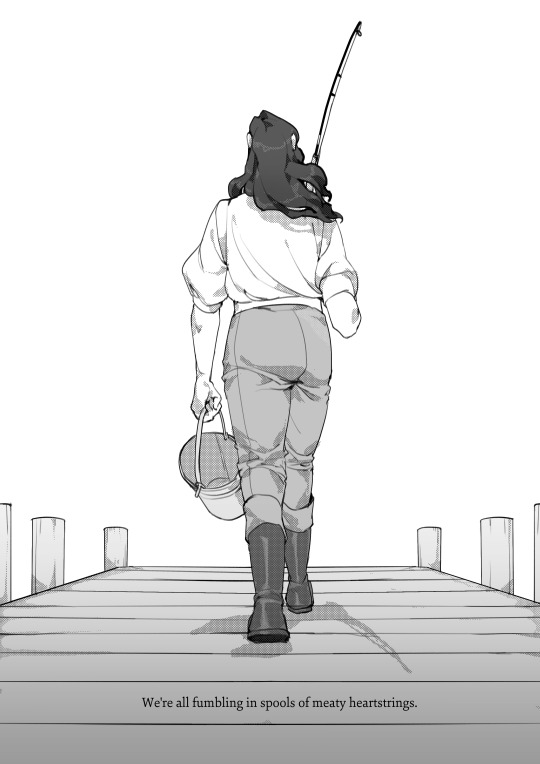
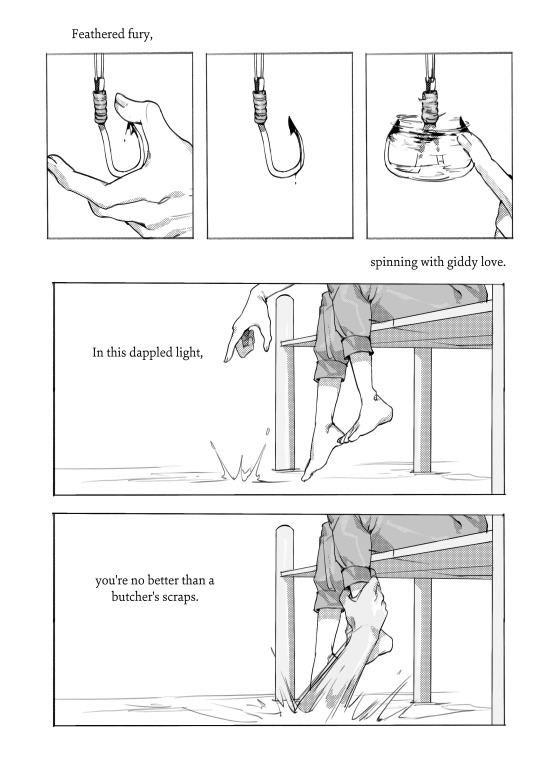
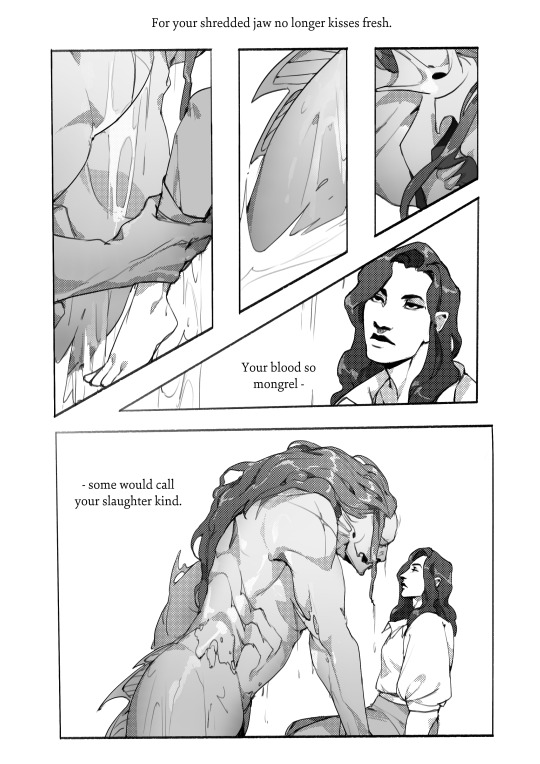
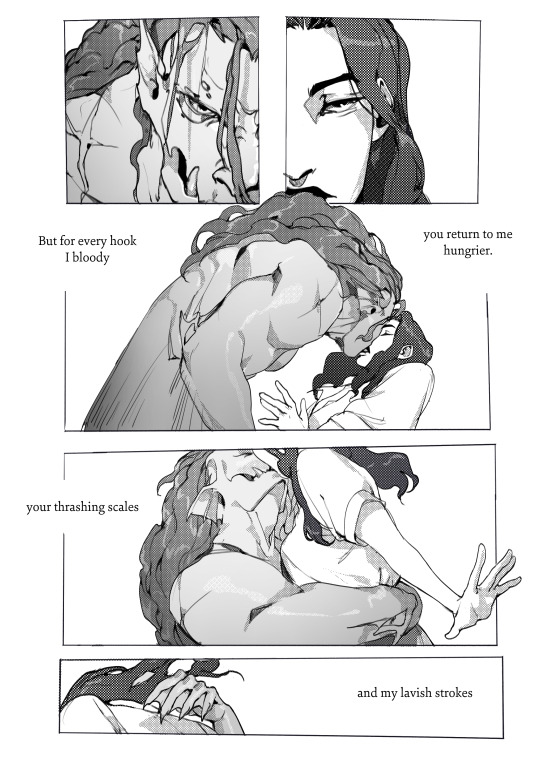
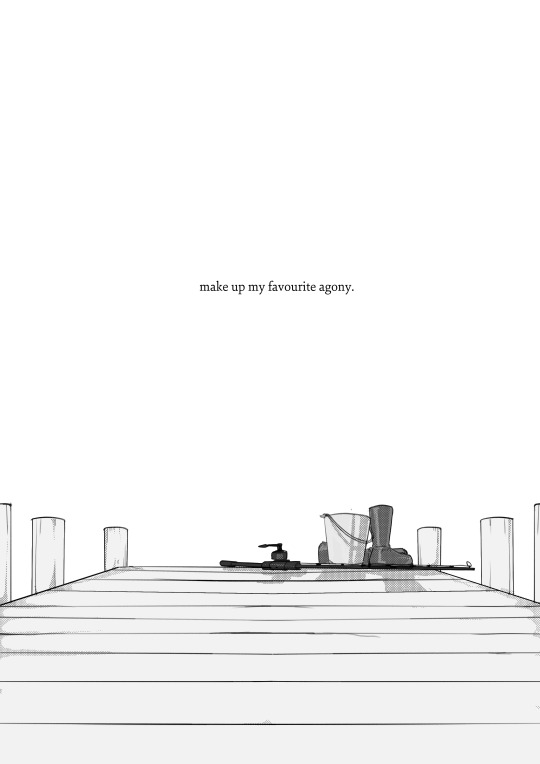
fishing twine.
--
a short comic about a lesbian fisherwoman and her dubiously healthy relationship with her sea monster girlfriend.
#im not super sure how to tag this#im never certain when it comes to original work#comic#lesbian#monster girlfriend#all of this is true#umm but yes um im trying to do more original work#i like doing comics#and this was fun#poetry#loosely#shout out to highschool me for writing this poem instead of finishing an english essay lmao#stillindigo art#lgbt#mermaid#stillindigo comics#soliloquy down to three
6K notes
·
View notes
Text



One of my fav essays by Brianna Wiest
1 note
·
View note
Text
“But first and foremost, I learned from Whitman that the poem is a temple—or a green field—a place to enter, and in which to feel. Only in a secondary way is it an intellectual thing—an artifact, a moment of seemly and robust wordiness—wonderful as that part of it is. I learned that the poem was made not just to exist, but to speak—to be company.”
― Mary Oliver, Upstream: Selected Essays
#quote#Mary Oliver#Upstream: Selected Essays#Upstream#Walt Whitman#Poetry#Writing#From the Writer's Desk#Tell all the truth but tell it slant#i will take the sun in my mouth#Current Reading#Current Reading Quotes#Rose Rereads#not out of void but out of chaos
336 notes
·
View notes
Text

Chase Berggrun, "Addressable Thou", pub. The Brooklyn Rail [ID'd]
#q#lit#quotes#typography#essays and articles#id included#chase berggrun#addressable thou#on poetry#sanctum#m#x
538 notes
·
View notes